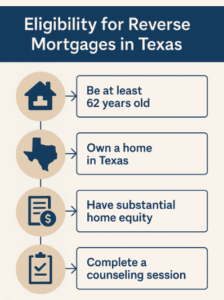
By Tyler Plack
Tyler Plack is the President of South River Mortgage. Tyler holds an active FHA Direct Endorsement (DE) underwriting certification and is the author of The Retirement Solution: Maximizing Your BenefitTyler is a seasoned entrepreneur and real estate investor renowned for his expertise in reverse mortgages and his commitment to addressing seniors' equity challenges. Tyler brings a unique perspective to his ventures, having built several successful companies throughout his career. His insights are frequently sought by industry publications, where he is recognized for his vast knowledge in the realm of reverse mortgages.
An avid investor in income-producing properties, Tyler is dedicated to helping seniors navigate their financial needs with compassion and expertise. When Tyler is not helping solve America's retirement crisis, he is a skilled pilot flying airplanes for fun.
If you’re a homeowner in Texas, especially in your golden years, you might be considering a reverse mortgage to boost your retirement income. But how does it work in Texas, and what makes this state unique for reverse mortgage eligibility?
In this quick guide, we’ll break down everything you need to know about reverse mortgages in the Lone Star State. We’ll discuss eligibility, benefits, and some Texas-specific considerations like home values, senior demographics, and loan rates.

What Is a Reverse Mortgage?
Before we dive into the specifics for Texas, let’s do a quick recap of what a reverse mortgage is. Simply put, a reverse mortgage allows homeowners aged 62 or older to convert part of their home equity into cash — without selling their home or making monthly mortgage payments.
👉 Learn more about how reverse mortgages work.
The most common type of reverse mortgage is the Home Equity Conversion Mortgage (HECM), which is insured by the federal government. With a reverse mortgage, the lender makes payments to you, and the loan is repaid when you sell the home, move out, or pass away.
How Reverse Mortgages Work in Texas
Texas is one of the most popular states for reverse mortgages, thanks to the state’s growing retiree population and rising home values. If you own your home outright or have a significant amount of equity, you may qualify for a reverse mortgage.
To qualify, your home must meet certain requirements:
- Be built after June 15, 1976, conforming to HUD’s manufactured housing construction code.
- Be classified as real property — meaning it’s permanently affixed to land that you own.
- Have a foundation that meets FHA guidelines to ensure stability and safety.**
- Be your primary residence where you live most of the year.
- Meet all local zoning and building codes
Are You Eligible for a Reverse Mortgage?
(Find out in 60 seconds)
Why Texas Is a Great Place for Reverse Mortgages
Texas has experienced substantial growth in home values, particularly in cities like Austin, Dallas, and Houston.
👉 Explore reverse mortgage options for high-value Texas homes.
- Rising Home Values: Texas has experienced substantial growth in home values, particularly in cities like Austin, Dallas, and Houston. As a result, homeowners can unlock significant equity through reverse mortgages, especially in growing metro areas.
- Large Senior Demographic: Texas has one of the fastest-growing senior populations in the U.S. According to the Texas Department of Aging and Disability Services, the number of residents aged 65 and older is expected to double by 2050. This growth contributes to the demand for reverse mortgages as a solution for retirees seeking to increase their cash flow.
- No State Income Tax: Texas is one of the few states without a state income tax, making reverse mortgages an attractive option for seniors who want to maximize their retirement funds.

Understanding Reverse Mortgage Loan Rates in Texas
When considering a reverse mortgage, reverse mortgage loan rates are a crucial factor to understand. These rates depend on several things, including the type of reverse mortgage (HECM or private loan); the current interest rate environment (whether rates are higher or lower at the time of borrowing) or the homeowner’s age and property value.
In Texas, reverse mortgage loan rates are typically competitive, but like any loan, they can vary from lender to lender. It’s essential to shop around and compare rates to ensure you’re getting the best deal.

Talk to a Reverse Mortgage Expert
At South River Mortgage, we specialize in helping seniors throughout Texas navigate the reverse mortgage process. Our team can guide you through the eligibility requirements, explain the loan terms, and help you understand reverse mortgage loan rates in Texas.
Our experienced team will walk you through requirements, paperwork, and next steps — so you can unlock your home’s equity with confidence.
📞 Contact South River Mortgage today to learn more about how a reverse mortgage could benefit you and your family
For a full breakdown of the upsides and risks of reverse mortgages, explore our simple pros and cons guide for seniors.



